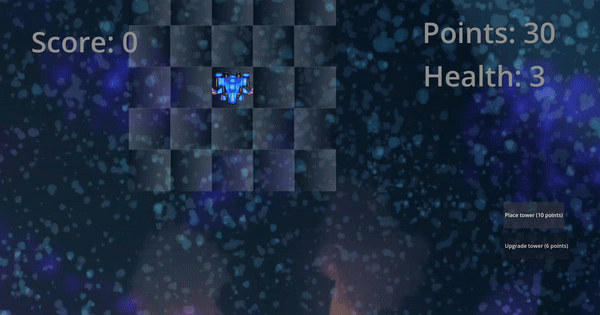Stellar Wardens - Grid system

func _ready() -> void:
GlobalNodes.baseGridNode = self
var cellDimensions : Vector2 = Vector2(125,125)
# Instantiate and place grid cells into the game world
for y in range(gridRowsCount):
var tempRow : Array[Node2D]
for x in range(gridColumnsCount):
var tempSquare : GridCell = gridSquare.instantiate()
tempSquare.position = position + Vector2(cellDimensions.x * x, cellDimensions.y * y)
tempSquare.gridRow = y
tempSquare.gridColumn = x
tempSquare.rotate(PI * (y % 2))
tempSquare.mouse_on_cell.connect(mouse_enters_new_cell)
tempSquare.mouse_off_cell.connect(mouse_exits_current_cell)
add_child(tempSquare)
tempRow.append(tempSquare)
# Builds up array of grid cells
gridCells.append(tempRow)
# Builds up array to store game items in each grid cell
var tempArray : Array[GameItem] = []
tempArray.resize(gridColumnsCount)
gridCellsContents.append(tempArray)
# Places the main ship to defend onto the grid
place_item_on_grid(shipColumn,shipRow,shipPlaceableItem)
mainShipNode = get_item_on_grid(shipColumn,shipRow)
func place_item_on_grid(row : int, column : int , item : placeableItem) -> bool:
if gridCellsContents[row][column] != null:
return false
var tempItemNode : GameItem = item.scene.instantiate() as GameItem
tempItemNode.position = get_cell_position(row,column)
tempItemNode.gridRow = row
tempItemNode.gridColumn = column
add_child(tempItemNode)
gridCellsContents[row][column] = tempItemNode
tempItemNode.gameItemDestroyed.connect(remove_item_from_grid)
return true
func remove_item_from_grid(row : int, column : int) -> void:
gridCellsContents[row][column] = null
func get_item_on_grid(row : int, column : int) -> GameItem:
return gridCellsContents[row][column]
func get_cell_position(row : int, column : int) -> Vector2:
return gridCells[row][column].position
# Attempts to power up an item on the grid, returns true if successful, returns false if unsuccessful
func powerup_item_on_grid(row : int, column : int) -> bool:
var gameItem : GameItem = get_item_on_grid(row, column)
# Check if gameitem furfills the conditions to be powered up
if gameItem == null:
return false
if gameItem == mainShipNode:
return false
if gameItem.currentlyUpgraded:
return false
# Checks if its possible
if !set_scale_of_item(row, column, gameItem.upgradeSize):
return false
gameItem.upgrade()
gameItem.currentlyUpgraded = true
# Sets the game item on the grid to be powered down after 5 seconds havbe passed by calling a function
var powerDown := Callable(self, "powerdown_item_on_grid").bind(row,column)
get_tree().create_timer(5).timeout.connect(powerDown)
return true
func powerdown_item_on_grid(row : int, column : int) -> void:
var gameItem : GameItem = get_item_on_grid(row, column)
if gameItem == null:
return
if gameItem.is_queued_for_deletion():
return
gameItem.degrade()
gameItem.currentlyUpgraded = false
set_scale_of_item(row, column, 1)
# Trys to scale up an item on the grid in a valid way so it doesn't occupy cells that already contain items,
# returns true if successful and false if note
func set_scale_of_item(row : int, column : int, itemScale : int) -> bool:
var gameItem : GameItem = get_item_on_grid(row, column)
var scaleCorner : Vector2 = get_valid_scale_pos(row, column, itemScale)
# If itemScale is 1, run a different procedure to treturn the item to its original scale
if itemScale == 1:
gameItem.position = get_cell_position(row,column)
gameItem.scale = Vector2(1,1)
# Remove gameitem from every cell except original position
for y in range(0, gridColumnsCount):
for x in range(0, gridRowsCount):
print(Vector2(y,x))
if x == gameItem.gridColumn && y == gameItem.gridRow:
continue
if get_item_on_grid(y,x) != gameItem:
continue
gridCellsContents[y][x] = null
return true
# Check for failure of finding a possible corner position for the scaled up gameitem
if scaleCorner == Vector2(-1, -1):
return false
# Add game item to every grid cell which it now spans over
for y in range(scaleCorner.y, scaleCorner.y + itemScale):
for x in range(scaleCorner.x, scaleCorner.x + itemScale):
print(Vector2(x,y))
gridCellsContents[x][y] = gameItem
# Correctly position and scale the game item on screen to correspond to scale up
gameItem.position = get_cell_position(scaleCorner.x,scaleCorner.y)
gameItem.scale = Vector2(itemScale,itemScale)
gameItem.position += Vector2(125 * (itemScale - 2) + 62.5, 125 * (itemScale - 2) + 62.5)
return true
# Returns a valid position for the corner of the scaled up game item, if no valid position, return a (-1,-1) Vector
func get_valid_scale_pos(row : int, column : int, itemScale : int) -> Vector2:
var gameItem : GameItem = get_item_on_grid(row, column)
# middle check
if check_scale_pos(row,column,itemScale,gameItem):
return Vector2(row,column)
# top left
if check_scale_pos(row - itemScale + 1,column - itemScale + 1,itemScale,gameItem):
return Vector2(row - itemScale + 1,column - itemScale + 1)
# top middle
if check_scale_pos(row - itemScale + 1,column,itemScale,gameItem):
return Vector2(row - itemScale + 1,column)
# middle left
if check_scale_pos(row,column - itemScale + 1,itemScale,gameItem):
return Vector2(row,column - itemScale + 1)
return Vector2(-1,-1)
# Checks if a scale up corner position for a game item is valid (none of the grid cells it would span already contain an item)
func check_scale_pos(row : int, column : int, itemScale : int, gameItem : GameItem) -> bool:
if row < 0 || column < 0:
return false
print(column + itemScale - 1)
print(gridColumnsCount)
if (row + itemScale - 1 >= gridRowsCount) || (column + itemScale - 1 >= gridColumnsCount) :
return false
for x in range(column, column + itemScale):
for y in range(row, row + itemScale):
if x == gameItem.gridColumn && y == gameItem.gridRow:
continue
if get_item_on_grid(y,x) != null:
return false
return true
